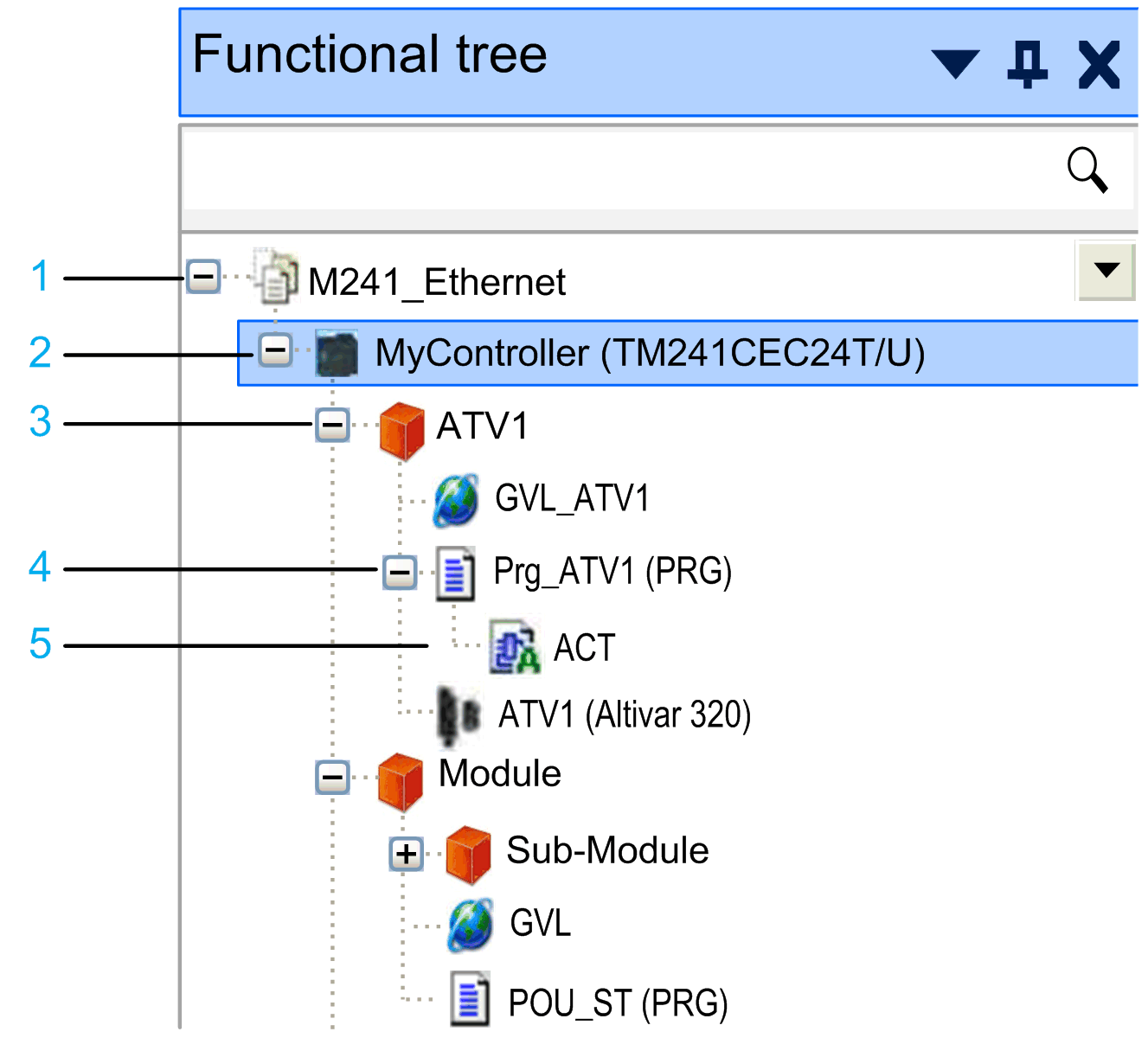Overview
The is available for controllers that have a node in the . It allows you to group multiple objects, such as IEC code or devices, and link them to a function. Once this function is created, you can reuse it. By creating this modularity, reuse your developments to improve your vision of the project. You can export / import the and reuse it in another project.
Description of the
Example of a :

1 Root node: corresponds to the name of the open project
2 Controller node: only those controllers that have a Functional Model node in the Devices tree are displayed
3 Functional module: nodes for structuring the Functional tree
4 Attached object: object attached to the functional module
5 Child object: child object of the attached object
Selecting Controllers
Select controllers for the as follows:
|
Step |
Action |
Result |
|---|---|---|
|
1 |
In the , right-click the root node, and execute the command . |
A new subnode is inserted for each selected controller in the . |
|
2 |
In the dialog box, select the controllers you want to add to the , and click . |
New controller nodes are added to the below the root node for each selected controller. |
Adding Nodes
To group the content of a controller according to your individual requirements, the allows you to create subnodes below the controller nodes.
|
Node |
Description |
How to create |
|---|---|---|
|
Functional module |
A functional module is a group of program elements intended to perform an application function. Functional module nodes create a hierarchical structure in the . To create a meaningful structure, edit the default name and assign a name of your choice to each functional module. |
Select a parent node (for example, the controller node), and click the green plus button. |
|
Attached object |
Attached objects are nodes of the other navigators (, , ) that represent the content of the controller. Note the following:
|
Right-click a functional module node, and execute the command from the contextual menu. From the dialog box, select the node you want to attach and click . |
|
Child object |
Child objects of the attached objects. |
Child objects are displayed in the . |
Deleting Nodes
To delete a node from the , right-click on it, and execute the command from the contextual menu. You are requested to delete the selected object, with its child objects, only from the or from the whole project.
Child objects cannot be removed from the only. If you intend to delete a child object, you are prompted to confirm that the object is removed from the whole project.
Reusing Functional Modules
If you have created a functional module that you want to reuse in the same or in another project, use the function templates as they can resolve the dependencies between the attached objects. The / commands and the copy/paste functions can also be used, but they only serve special cases as described in the following sections.
Reusing Functional Modules by Using Function Templates
You can save a functional module to a function template by right-clicking the node and executing the command from the contextual menu.
To instantiate a functional module from a function template, right-click a node in the , and execute the command from the contextual menu.
For further information, refer to the Managing Function Templates chapter.
Reusing Functional Modules by Using the / Commands
When you use the command and the command for reusing functional modules, note the following:
|
If... |
Then ... |
|---|---|
|
If you export a complete controller device, and then import it in the same or in another project, |
Then the functional model is recreated. |
|
If you export and import the functional model only, |
Then the attached objects are not recreated. |
Reusing Functional Modules by Using the Copy and Paste Functions
When you use the copy and paste functions for reusing functional modules, note the following:
|
If... |
Then ... |
|---|---|
|
If you copy a complete controller device, and then paste it in the same or in another project, |
Then the functional model is recreated. |
|
If you copy and paste one or more functional modules only, |
Then the attached objects are not recreated. |
It is not possible to copy and paste attached objects in the .